In the footsteps of Girl Number 1: A family reflects
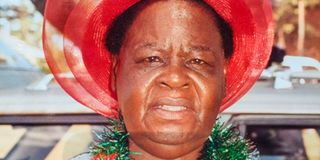
Pastor Abigail Kageha Indire in her pioneering days. Her legacy in education, faith, and women’s empowerment continues to inspire generations.
What you need to know:
- Abigail Kageha Indire was the first girl to be admitted to Alliance Girls High School, defying colonial norms that limited girls' role in society.
- From colonial Kenya to national matriarch, Abigail was a lifelong lantern whose light shone for girls where none existed before.
On May 8, 2025, an unusual obituary appeared on the Daily Nation's transition pages. It was titled “Girl Number 1 Goes to Heaven (Heaven’s Gain)”, announcing the passing of 94-year-old Abigail Kageha Indire. Her death came just 48 days after that of her husband, Filemona Indire, Kenya’s first professor of education, who died on March 13, 2025. She followed on April 30.
How did she become Girl Number 1 that it had to be included in a newspaper obituary? And why would her departure from Earth be framed as Heaven’s gain?
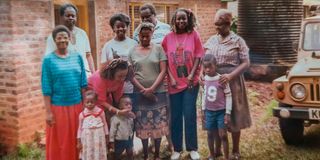
Pastor Abigail Kageha Indire (right) and her family. Her journey began as Admission Number 1 at Alliance Girls’ High School. Her legacy in education, faith, and women’s empowerment continues to inspire generations.
We sought to trace the roots of this remarkable obituary. For one, being a nonagenarian means she was born and grew up during colonial times when Kenya was under British rule. The colonial masters adhered to Victorian values, which promoted the domesticity of women and saw their value solely as wives and mothers, nothing more. These values bestowed men with the power to be leaders and thinkers, while women were relegated to being subservient homemakers and domestic workers.
So, how did she escape the grip?
Thursday last week: We visit her home on the slopes of Lusaala Hill in the village of Vigina, Vihiga County. Something is different about this matrimonial village of Abigail, who was born in Kigama, Sabatia, the same county.
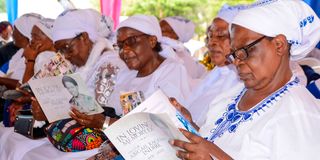
Mourners gather in solemn tribute during the burial service of Pastor Abigail Kageha at Vigina, Vihiga County, on May 16, 2025. They bid farewell to a pioneer in faith and education, a woman whose work touched hearts, opened doors, and transformed generations.
She was brought up by her father, a butcher, and her mother, a homemaker, as their sixth child in a family of 10. She later taught her mother how to read and write. Her mother had interacted with educated missionaries, but their mission was different: To “civilise with religious teachings” rather than empower African women with literacy or numeracy skills.
At 9.22am, as the thick red soils bask in the warm morning sun, blue-uniformed girls with backpacks hurry to a local junior secondary school, while the boys stroll with their hands in their pockets, like bosses heading for the bank.
Save for these learners, the earthen road is quiet, nestled in the greenery of a village surrounded by eucalyptus and cypress trees, with a few indigenous ones scattered about. The air is occasionally disturbed by the baaing of sheep and mooing of cows grazing in the lush fields. Locals later informed us that, at this hour, women usually picked tea. This was confirmed the following day when a tea collection truck passed through.
Meanwhile, the men, whose primary work is livestock rearing, have gone to sell some livestock at Luanda Market along the Kisumu-Busia highway. Thanks to the solitude of this seemingly unwelcoming road, we get lost. We turn back and, luckily, find two women heading for her home. They lead us there.
Welcome to the home of the late Abigail and Filemona, located at the end of the road on a slope, wire-fenced and bearing a security sign at the barred gate, indicating protection by a private security firm. The matriarch lies in a shiny brown casket placed on a bier settled on a red carpet under a small tent, in front of two large concrete houses. A few steps away lies the fresh grave of her husband, covered in concrete and adorned with a wreath.
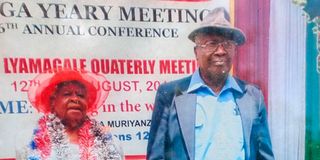
Pastor Abigail Kageha Indire with her husband, Prof Filemona Indire.
One of the women, dressed in a white top and a black-and-white striped ankle-length skirt – one of those who led us here – briefly stares at the casket, her fingers covering her mouth as though she is lost for words.
Only a few people are present at this hour, still before 10am, so she is easy to notice. Once she steps aside, I approach her. I learn that she has been Abigail’s farmhand, doubling as a domestic worker, since early last year. Her name is Judith Musimbi. Her world, she says, turned upside down the day she was informed of Abigail’s death.
“As I looked at her, I asked, ‘Why did she have to leave us?’” she says, choking back tears. “I haven’t been sleeping well since we were told she had passed on. I’m an orphan, and she was like my mother. She helped pay school fees for my children.”
Judith is a single parent raising three daughters. Two were waiting to join college, thanks to Abigail’s promise to support their education. The youngest is in Form Two. “She hated to hear the girls weren’t in college. She’d say, ‘You must do all you can to see them through college.’ Now she’s gone, I feel lost and hopeless,” Judith says, her hands on her head in despair.
Abigail, as the first African girl in the admission register for African Girls’ High School (now Alliance Girls’ High School) in 1948 – the first boarding secondary school for African girls in Kenya offering formal education – knew the power of education and fully enjoyed its fruits.
Her spirit of educating girls never dimmed after retirement. From personal experience to mentoring others, she understood what stood at the end of it all, and wanted those supporting her in old age to feel it too, even if through their children. “She was incredibly encouraging and always reminded me not to give up on life,” Judith says. “I would often find myself in tears whenever I heard her groan from the pain of her injury.”
From 1952 to 1972, when she retired, her life revolved around education. Soon after receiving her teaching certificate from Alliance in late 1951, she joined Vihiga Women’s Teacher Training Centre, then moved to Goibei Girls’ High School, and later to Vihiga Intermediate School. She also taught at Siriba Teachers Training College (now Maseno University’s Siriba campus) before moving to Nairobi, where she held teaching roles at City Primary School and Mbagathi Road Primary School.
Before retiring, she served as an executive officer in the Ministry of Education from 1965 to 1970. Afterwards, she joined the church, serving as a family life education officer under the National Christian Council of Kenya.
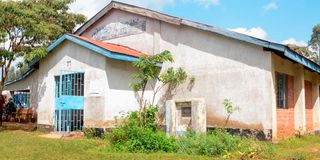
Vigina Friends Church (Quakers), a testament of faith and vision, built by Pastor Abigail Kageha Indire and her husband, Prof Philemon Indire. Together, they laid both spiritual and physical foundations that continue to uplift generations in Vihiga County and beyond.
This continuity in championing education is what Alliance Girls High School Chief Principal Jedidah Mwangi calls the true spirit of a Busherian (an alumna of the school). “A pioneer who chose to walk in the light, as per our school motto,” she says in tribute.
Her light did not go out with retirement. Between 1960 and 1962, she studied Sociology and Home Economics at Ball State University in Muncie and at Indiana University in Bloomington, Indiana, US. With this new capacity came new opportunities. In 1973, she joined the Child Welfare Society as an assistant executive officer and administrator of the Mama Ngina Kenyatta Children’s Home in Nairobi. By 1977, she had had enough of working in government and resigned to return home and focus on farming.
“She liked to plant things; she used to plant almost anything. We grew cashew nuts here, imagine that! Pineapples, bananas, oranges, mangoes, lemons, all kinds of fruits and vegetables. She enjoyed agriculture. We used to have a lot of cows – over 40 or 50 goats, chickens, turkeys,” says her daughter, Clara Indire.
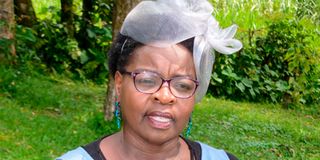
Clara Indire, the last-born daughter of Pastor Abigail Kageha Indire, during an interview with Nation Gender at their family home in Vigina village, Vihiga County. She reflected on her mother’s towering legacy as a spiritual leader, education pioneer, and matriarch.
Abigail had reached a point of giving back to society and took part in several development activities through the church. Through her mobilisation skills and ability to bring people together to raise resources for the poor, she earned a seat on the Vihiga Urban (Municipal) Council, becoming the first woman to hold the position from 1981 to 1983. “She and her husband helped this church,” says Mary Kamadi, former pastor of Vigina Friends Church, where Abigail was a long-time member. “She mobilised materials to build the church and supported pastors financially and with essentials. At Christmas, she ensured every woman in church received a gift package.”
Mary remembers one standout tradition Abigail introduced: The lantern ceremony. Women who selflessly served the church and community were given a lit lantern as recognition and encouragement not to let their light dim. “This inspired other women in church to serve with love and kindness. That’s why we also lit a lantern to say her legacy lives on,” Mary says.
While Abigail left behind an impressive record of career achievements in both colonial and post-colonial Kenya, her star might have been dimmed early if not for the men in her life: her father and her brothers. Victorian values, spread by British missionaries, had led many Kenyan men to believe that girls were only meant to be wives and mothers. Missionary education prepared them not for careers in colonial industries but for domestic service.
But the men in Abigail’s life stood by her. After excelling at Kigama Primary School and passing the Kenya African Primary Examination at Kaimosi Girls High School, she was selected among the first 10 girls to join African Girls High School, a progressive initiative by Scottish missionaries. Here, for the first time, African girls were taught science, technology, engineering, and mathematics subjects. Mathematics, Chemistry, Physics were traditionally reserved for boys. They also learnt English, Geography, History, Christian Religious Education, Housecraft, and Health Science.
“There’s a story she used to tell,” recalls Grace Kageha Mahasi, her granddaughter, proudly named after her. “She received her acceptance letter to the school, but her village didn’t understand or support it. People stole her clothes to stop her from going. But with her father’s and brothers’ support, she left with the one dress they hadn’t stolen, determined to pursue her education.”

Grace Kageha Mahasi, granddaughter of Pastor Abigail Kageha Indire, during an interview with Nation Gender at the family home in Vigina, Vihiga County. She recalls her grandmother as a woman who ‘took up space’ and refused to be defined by colonial limitations on African girls.
Grace says her grandmother had “the most incredible memory,” even in old age. One thing she’ll never forget, besides her infectious laugh, is her insistence on never losing a chance to expand her knowledge. Now aged 30, Grace is pursuing a Doctorate in Public and Community Health in the US.
For Clara, the daughter, it was a heartbreaking experience. She recalls how she admitted both her parents to Nairobi Hospital, but because of their conditions, they could not see each other. She had to take videos of each of them and show them in turns as she shuffled from one room to the other. On the day her father died, she had just moved from his ward to her mother’s. Twenty minutes later, she returned to find he was gone.
For six days, she didn’t tell her mother that her sweetheart with whom she had shared 70 years and had seven children, one of whom is deceased, had rested. But even without being told, Clara says her mother knew her husband was no more and was only waiting for confirmation. The day she finally received that confirmation, Clara says, her world was shattered.
“Dad was traumatised by her injury; that’s how much he loved her. He ended up having a stroke, which affected his system, and he had to go through dialysis and other treatments. Because of that, they couldn’t see each other. At the same time, Mum was undergoing hip surgery and dealing with bedsores. It was such a difficult period,” she explains. “She really wanted to see him, but she couldn’t. So what I used to do every single day for about a month, was go from one ward to the other. I’d take a recording of mum to show dad, then I’d record dad and take the video back to mum, just so they could at least see each other in some way.”
Now, Clara’s world is in pieces, having spent most of her time with them during their final moments on Earth. She cannot imagine life without her mother, who always told things as they were. But in the pain lie cherished memories and lessons. “I had the privilege of pioneering things in school and university. I learnt that from her. Just go on and establish something. Don’t wait. Do it. Make mistakes, learn from them,” she says.
Friday last week: Today is the day Abigael is given the final respects at Vigina Friends Primary and Secondary School grounds. Today, the village is busy, and people are sitting in different corners of the field, soaked in mud from the overnight rains. By 9am, women, mainly from her church, are already seated in the large white tent themed in blue and pink, as locals throng in.
Edward Indiazi, who had travelled from Nairobi to attend her burial ceremony, has fond memories of her and her husband as a couple who inspired local girls and boys and made efforts to boost education among locals in the post-colonial days. He says while she is remembered as someone who taught in various schools, her husband, in particular, brought the first white teacher to Vigina Friends Secondary School in 1974, when it had just been established. He says he was one of the first students to be enrolled at the school.
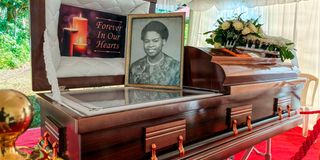
The coffin bearing the remains of Pastor Abigail Kageha Indire at her home in Vigina village, Vihiga County. The trailblazer in education and faith passed on at 94.
Their inspiration seems to have surpassed generations. A teacher at Vigina Friends Junior Secondary School, who prefers to be called only “Teacher,” says many of the girls here want to identify themselves with Abigail. “We have girls here who have nicknamed themselves ‘Pastor Abigail-the teacher’. You hear boys say, ‘I want to be famous like Professor Filemona,’” he says.
“The family should consider setting up a community library here in honour of their educational work. That would be the best memory of their legacy in this area, and I think it would inspire girls and boys to aim higher.”
Abigail died at Avenue Hospital in Kisumu after two cardiac arrests. She had been hospitalised for an infection from wounds sustained in a January 2025 fall that fractured her hip. While Abigail was officially bid farewell from Earth and welcomed into Heaven—a life into which light had shone and reflected back just as brightly, for Judith, it marked the beginning of darkness. “When I look into the future, I only see darkness. In her, I had a mother. Now I have none,” she says, her tear-filled eyes glazing over.


